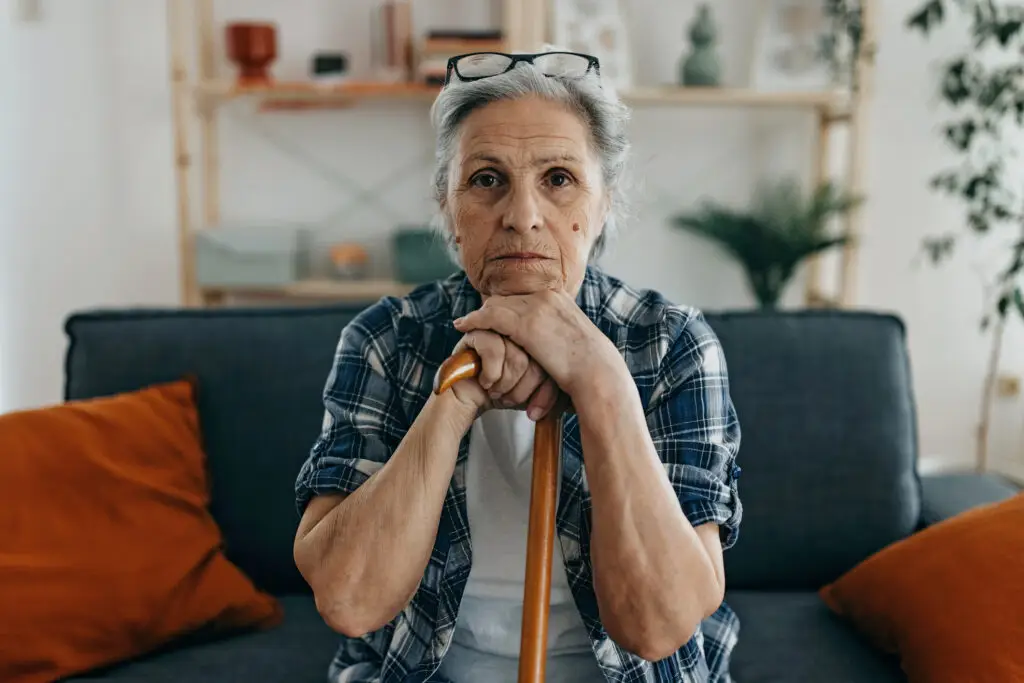If you have never experienced depressive symptoms before, it can be hard to recognize when depression is playing a role in your cancer journey. Between potential trauma due to your diagnosis, physiological side-effects, and major life and body changes, there’s many reasons why depressive symptoms can arise for those fighting breast cancer.
Health related depression and anxiety (which differs from chronic depression) affects many breast cancer patients. A 2020 study found that almost one third of early stage breast cancer patients experienced depression and anxiety symptoms, as did 68.2% (depression) and 73.8% (anxiety) of advanced stage breast cancer patients.
Certain factors can increase your likelihood to experience health related depression and anxiety. Married women in particular are prone to struggling with anxiety (71.4%) and depression (79.5%) compared to single women (20.5%). This is likely because they have a spouse and children whose wellbeing now and in the future concerns them. Losing one or both breasts can change the way women view themselves—or how they think others will now view them. This can make coping with emotions after surgery challenging even with the knowledge that surgery is their best chance for eliminating the cancer. Research shows that 81.8% of patients who underwent a mastectomy or lumpectomy as part of their treatment plan had depressive symptoms.
Point being—depressive symptoms are far too common for breast cancer patients and the key to coping (and improving your overall treatment outcome) with this symptom is recognizing the signs of depression, prioritizing your mental health, and making a plan for treating any symptoms that arise.
Why mental health matters during treatment
First things first, it’s important to understand the important role that mental health plays in your cancer treatment. Ideally, your doctor and support team will look at your physical and mental health holistically. Alongside treating physical symptoms and side effects, your emotional well-being needs to be taken into account.
Your doctor should be proactive about screening for depression throughout your treatment, but you should also conduct your own regular mental health check-ins. Having access to resources such as private therapy, medication, and support groups can help, but that support can only be arranged if everyone is aware of how you’re feeling.
If you’re experiencing any depressive symptoms (we’ll break those down for you shortly), talk to your doctor so they’re aware of what’s going on and can help support you. You deserve holistic care and the support you need to feel your best physically and emotionally.
How to recognize depression
Recognizing the signs, symptoms, and sources of depression can help you approach your doctor about understanding why you’re feeling the way you are and what your next care steps can be.
Indicators of depression
The following signs can be indicators of depression:
- A personal history of depression
- A weak social support system
- Persistent irrational beliefs and negative thinking (especially surrounding your diagnosis)
- Major life disruptions or dysfunction caused by your diagnosis
Symptoms of depression
Knowing where the depressive symptoms may be coming from can be empowering and help you continue to enhance your treatment plan:
Evidence-based guidance powered by NCCN Guidelines®
Personalized treatment plans shaped by the latest oncology standards—tailored to your diagnosis.
Get started
View your personalized treatment plan in the Outcomes4Me app
Use your diagnosis to unlock personalized NCCN Guidelines®-aligned recommendations.
Continue in app
- Sadness
- Loss of interest or pleasure in activities you previously enjoyed
- Change in weight
- Difficulty sleeping
- Sleeping all the time
- Energy loss
- Feeling worthless, helpless, or hopeless
- Thoughts of death or suicide
Talk to your doctor if you’re experiencing any of those symptoms or if you are simply feeling like you need mental health support. Studies have suggested that embracing inappropriate coping mechanisms—such as avoidance–can lead to higher levels of depression as well as anxiety and fatigue, so keeping your concerns to yourself isn’t likely to help you progress.
Sources of depression
Chemotherapy and certain pain medications (particularly opiates) can cause depression—as can the emotional toll that comes with a breast cancer diagnosis. Ovarian suppression or removal can also lead to depression.
The following types of hormonal therapy can cause depression:
Cancer care guidance for every step of your journey
Get treatment options, clinical trials, and support tailored to your diagnosis--all in one place.
Get started
See treatment options, manage symptoms, and stay informed—all in the app
View treatment options and trials personalized to your diagnosis—plus track progress in real time.
Continue in app
- Arimidex (chemical name: anastrozole)
- Aromasin (chemical name: exemestane)
- Evista (chemical name: raloxifene)
- Fareston (chemical name: toremifene)
- Faslodex (chemical name: fulvestrant)
- Femara (chemical name: letrozole)
- Tamoxifen
If you’re taking these medications and you feel depressed, there could be a relationship to ask your doctor about. That being said, hormonal therapy is an important part of your treatment plan and is proven to reduce the risk of recurrence and improve overall survival. In the Outcomes4Me App, you can track symptoms, like depression or anxiety, as well as your medications. Presenting that information together to your doctor could help diagnosis the source of your symptoms.
It may be difficult to pinpoint the exact cause of your depressive symptoms, as multiple factors may be contributing, but knowing the potential source or sources can help you determine what your next steps may be. Suffering from depression can make it difficult for some to regularly take their medicine, but it’s important you stick with your doctor’s recommended treatment plan.
How to cope
While you work on a treatment plan with your doctor, these are some steps you can take to help fight feelings of depression.
- Set achievable day-to-day goals. You don’t need to be an overachiever here. Set some realistic goals to complete each day to feel a sense of purpose and accomplishment. Having trouble sticking to your goals? Using a free app to track your goals and progress, like the Way of Life app, can help keep you organized and motivated.
- Spend time on recreation. Make time to enjoy some of your favorite hobbies or recreation activities. Painting, playing music, and enjoying any activity you have positive emotional connotations with can help.
- Embrace human connection. Connection is key. If possible, interact with your support system of friends and family members on a daily basis. If you are self-isolating, make sure you talk to someone via phone or video chat every day. If you need help finding a support system, BreastCancer.org has a free virtual community you can join.
- Eat well. What you eat can affect how you feel. Try to embrace a diet full of whole grains, fruits and vegetables, and lean protein to help give your immune system and mental health a leg up. You can learn more about nutrition and breast cancer here.
- Sweat it out. Exercise can reduce stress levels and ease symptoms of depression. Your treatment plan may limit your fitness options, so talk to your doctor first about what kind of physical activities you can safely do. You don’t need to hit the gym every day. Set small but attainable fitness goals such as going on a neighborhood walk every morning or stretching twice a day so you can work towards reaching your toes.
- Skip your next drink. Alcohol can make depression worse and can interfere with antidepressant medicine. Consider ordering a mocktail during your next happy hour and at the very least double check with your doctor to make sure alcohol won’t interfere with any medication you’re taking.
Not all of these tips will suit everyone and it’s important to consult your doctor when any signs of depression arise, but hopefully they will help provide you with ways to cope while you navigate this challenging time.
Tracking symptoms like depression and anxiety can help you and your doctor understand their frequency and severity. You can track and manage your symptoms in the Outcomes4Me App, so that you can bring that data with you to your next doctor’s appointment. Download the app today!
Personalized support for real care decisions
Understand your diagnosis, explore clinical trials, and track symptoms--all in one place.
Get started
Compare treatments, prepare for appointments, and track side effects—all in the app
Built for your diagnosis, Outcomes4Me gives you the tools to make confident, informed decisions—right when you need them.
Continue in app






